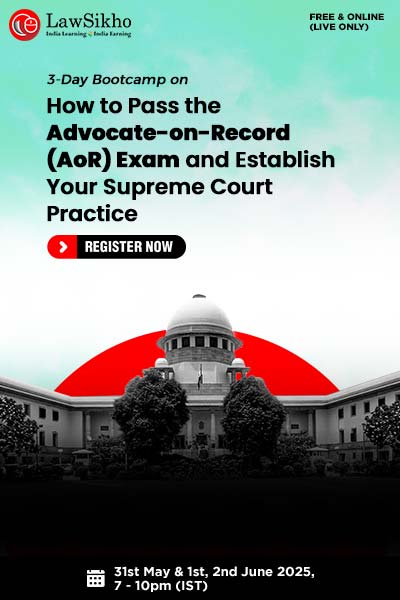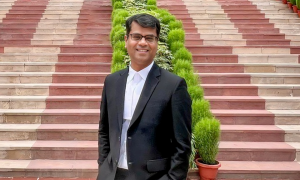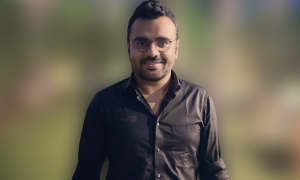This interview has been published by Namrata Singh and The SuperLawyer Team
A very warm welcome to everyone! The SuperLawyers team is back with another enriching and informative session. Today, we are thrilled to introduce our guest, Mr. Avinash B. Amarnath. Thank you so much for accepting our invitation. Avinash sir is currently a Partner in the Competition and Disputes team at Chandhiok & Mahajan Advocates and Solicitors. He leads the firm’s Hyderabad office and South India disputes practice, specializing in advising clients on complex competition law and dispute matters.
A very warm welcome from the entire SuperLawyers team.
Thank you. It’s a pleasure to be here.
Sir, after a decade of commendable excellence in the legal profession, could you share with us why you chose law? Was it a calling, or a conscious decision from the start?
For me, law has always been part of the family. My father is a practicing lawyer, and my mother, though not a practicing lawyer, is a law graduate. However, law was never imposed on me—I had the freedom to choose. I would say it was a conscious decision. Honestly, I chose law almost by a process of elimination. I didn’t want to pursue science, and I had a choice between commerce and law. Law seemed intriguing, especially because I had an interest in humanities during school. I felt that studying law would allow me to explore subjects like political science, which is why I chose it.
That was concise and insightful. Moving on, you’ve been working in the corporate sector for years now. What keeps you going in this environment? Do you have any particular routine or professional discipline that you follow?
So, I think the first thing I would say is that the routine that works for me may not work for everyone. My first piece of general advice is that everyone has to find their own routine. However, a few tips I’ve noticed that generally help include sleeping early, waking up early, and avoiding screen time.
You’ll find that you actually have a lot more time in the day than you think, especially if you follow these guidelines. It’s also very important, particularly in this stressful corporate culture, to prioritize your family and yourself.
One of the best pieces of advice I received as a young lawyer was from someone who used to run a law firm. This advice has stuck with me for a long time, and I try to follow it: no matter how much work you have or how tight the deadlines, always dedicate three to four hours to the following things:
- Spending time with your family.
- Engaging in physical exercise.
- Pursuing any personal hobbies.
Guard this time scrupulously and strictly. This is what I try to follow to maintain discipline. Of course, the most important thing in this is that, the corporate culture demands flexibility.
So, while this is a routine, it often gets broken, and you have to be innovative. For example, I travel a lot, and when I do, some of this strict routine gets disrupted. But you have to be innovative and find alternatives.
If I’ve been traveling too much, I make sure to completely reserve that weekend for my family. Even when I’m traveling, I try to fit in quick 10 to 15-minute exercises in the morning. This is something I’ve realized over time. It took me 10 years to figure out this routine, so it will take time. As I mentioned at the beginning, this works for me; it may not work for someone else. The idea is to find your own routine and what makes you tick.
Thank you, sir. I’m sure we all recognize the importance of limiting screen time and balancing various aspects of life, especially in such a high-pressure environment. This wisdom is particularly valuable for those of us just starting out. Let’s move on to our next question: Dispute resolution involves a lot of strategizing and planning. How did you develop your flair in this area, and how much do you enjoy it?
Absolutely. I was fortunate to have very good mentors and guides when I started in the profession. The most important thing in litigation, especially in strategizing and planning, is paying attention to detail. One of the first things I was told very early on is to read the entire file—whatever it is, even if it’s a small transfer petition matter.
Even if the matter is just getting adjourned, I was still told to read the file as thoroughly as possible, front to back. This habit, ingrained in me from the beginning, made me realize that sometimes, the more you read and reread, new things come to light that you wouldn’t have noticed before.
This attention to detail really helps in planning and strategizing. When a client first approaches you, they provide a broad perspective, often their own, which may not be reflected in the documents. So limiting yourself to just what the client says isn’t sufficient. You need to verify their perspective by examining the documents. As I mentioned, the devil is in the details.
This practice slowly developed my flair for this work. The more I read, the more confident I became with the case, and the better I could strategize. It’s a process of evolution, right? As a young lawyer, your role is often limited to knowing the facts well. If you have a strategy, great, but usually, you’re expected to have a solid understanding of the facts, along with thorough legal research.
As you grow older in the profession, you start engaging in actual strategizing. It’s like a game of chess—you make a move and see how it plays out. Sometimes it works, sometimes it doesn’t. When it doesn’t, you go back, regroup, and try a new move. It’s a constant game of chess, and I enjoy that.
Strategizing and planning, especially in litigation, is like sports. It’s not always going to be a perfect victory on the first try. There will be setbacks, but what’s important is to focus on the long-term goal—for both the client and yourself—and work towards that in the best way possible. You may lose some small battles, but the idea is to win the war, not every single battle. That’s how I approach and enjoy it.
You have been involved in a lot of high-profile cases. That has received media attention. And we all know how media attention can turn both ways. It can celebrate you one day. It can suddenly criticize you unnecessarily the other day. How do you keep calm in these specific high-profile matters where really high stakes are involved?
I think I’ve been a bit fortunate because I haven’t had to face intense media pressure directly. However, there were instances where difficult questions were asked, and I received calls from media houses seeking comments on a very contentious case. In such situations, we were strictly instructed by the client not to make any comments.
Generally, in cases, I always try to focus solely on the case itself and block out any external noise, as I call it—whatever is happening outside. I believe that in high-profile cases, it’s even more important to understand that your role is limited to being a lawyer in that case and not to worry about the repercussions or consequences. Your job is to provide the best strategy, whether it’s a defense or prosecution, and offer the best advice to your client. The outcome is not in your hands, nor is what people make of it or think about it. You have to let it go. In one word, you need to develop a thick skin and ignore what the media is saying.
Moving on to the next question, your academic excellence at King’s College is truly commendable. As someone who has studied both in India and abroad, how was your law school experience different there compared to India?
I should start by saying that my law school experience was 10 years ago, so I’m sure things have changed in India since then. However, back then, my experience in India was that law education was still heavily focused on rote learning and less on application. When I studied abroad, that was the biggest difference I noticed.
The way classes were conducted there was different. Typically, in India, you come to class, open the book, and learn the concept then and there. But there, the structure was different—you were given a set of reading material before class, and you were expected to read it on your own. This might also be because it was a master’s course, so there was an assumption that most people already had a basic understanding of the law. Still, I really liked that system. You do your reading at home, and when you come to class, you’re taking the discussion to the next level. You’re applying the knowledge you’ve already gained to difficult questions or discussing specific, controversial, or complex topics in more detail.
Even the exams were different. The questions were mostly problem-based, requiring you to apply what you’ve learned and provide solutions, rather than just reproducing information. This was a significant difference for me. Another major difference was the encouragement from the faculty to have and express opinions. They would encourage students to form their own opinions and make it clear that there is no right or wrong answer, as long as you can back it up with solid logic. They might challenge your logic if they disagreed, but if you could defend your position, they respected that. This openness and application-based learning were aspects I truly enjoyed at King’s College.
That was very interesting. I’m sure law schools in India are also starting to embrace these changes, though we still have a long way to go in fully adopting application-based learning. How did this experience shape your legal perceptions once you returned to India and began practicing?
To be honest, it was partly that education, but also working with some lawyers here who were educated abroad, that really changed my entire perspective on law.
In most subjects in India, let me take law or even medicine as an example—you’re often considered a good doctor if you can quickly prescribe the right treatment. Similarly, the expectation for lawyers in India is that you should know every section and answer legal problems on the spot, complete with section numbers and details. However, I realized that’s not what practicing law is really about, nor is it what makes a good lawyer.
It’s impractical for a lawyer to know every single law by heart, especially given the vast range of knowledge required. What’s important, and what changed my perspective, is knowing how to read and interpret the law. When presented with a problem, you should be able to identify the relevant subject, pick up the relevant law—perhaps one you’ve never read before—and immediately apply yourself to it. You should be able to analyze the law and argue points based on the definitions and sections. The focus should not be on merely retaining knowledge, but on how to use that knowledge effectively and strategize.
So, in that sense, my approach to practicing law changed completely. I no longer stress about remembering every detail; instead, I focus on how to strategize and apply the knowledge that’s available in front of me.
How to read the law is such an application-based concept, which we should all imbibe no matter whether or not our colleges and our educational setups are telling that. We can definitely make it a practice. Thank you so much, sir.
Talking on these lines, sir, how do you balance this personal life with professional commitments, any hobbies or any passion, or interests, that keeps you lively?
As I mentioned earlier, I think it’s important to revisit the discipline points we discussed because maintaining those habits helps me balance professional and personal life. I want to touch on hobbies, but something else just came to mind. When you’re at work and you get a call from home, you might answer, but usually, even if you do, you say, “I’ll call you back, I’m at work.” I believe the key is to give that same level of importance when you’re at home, spending time with family, or doing something personal. There will be emergencies, and sometimes you genuinely need to take a call and work, and I completely understand that. However, more often than not, if someone calls you, even if it’s from work or a client, you can tell them, “I’ll call you back.” It’s important to give the same respect to your personal time as you do to your work time. If someone calls you while you’re with your family, it’s okay to tell them, “I’ll call you back in a bit.”
Now, regarding hobbies, I’ve always been a sports fan, particularly passionate about cricket, especially test cricket. When I’m not working, I’m usually either following cricket, trying to play wherever I can, or discussing it with everyone I know. One of the things I love about sports is how it parallels what we do as lawyers, especially in court. It’s like a game of chess, similar to sports where you constantly see strategies and counter-strategies. I find that very appealing, so I try to follow and play sports as much as possible.
Moving on, how would you compare the corporate work culture in law firms versus the litigation culture in chambers? If you had to choose between the two, which would you prefer based on your experience? Could you elaborate on that?
Sure. Both have their pros and cons, and I’ll explain my preference based on my personal reasons. I found litigation chamber work more appealing, but I think the ideal scenario is to combine the best aspects of both, which I see happening, especially in our firm.
In corporate work culture, one of the pros is that you are more directly in touch with the client, which gives you a very different understanding. In corporate and commercial law, there’s a legal position and a commercial reality. For a client, especially a company or a business, the end goal is that commercial reality—whether they’re trying to make or save money or achieve some other goal. The legal position may not always support that goal, so the challenge is to find an alternative or a middle path that satisfies that goal while staying within the confines of the law. In pure litigation chambers, responses can be more black-and-white: “This can be done, this cannot be done.” But in a corporate law firm, you develop the art of finding solutions, saying, “This strictly cannot be done, but we can explore this alternative.” That’s crucial as a commercial lawyer—you have to be solution-oriented, not just give yes or no answers.
Another advantage of law firms is that you get more time to work on a particular case. In litigation chambers, files often come to you the day before a hearing, leaving you little time to fully understand the case. In a law firm, you might work on the same case for two to three months, allowing you to interact with the client, get all the necessary clarifications, and build a strong strategy.
On the downside, one con of law firms, and this varies, is that sometimes there’s too much focus on presentation—form over substance. A document might look very polished, but if the substance isn’t strong, it shouldn’t pass the test. Another con is the lack of court time—you don’t get to go to court every day, maybe once a week or a few times a month.
In litigation chambers, the focus is primarily on the substance because you don’t have time to worry about presentation. The emphasis is on points of law, developing legal arguments, and finding and interpreting judgments. In a litigation chamber, you’re expected to read judgments thoroughly, knowing both the points that favor you and those that don’t. Plus, being in court every day is a significant advantage.
However, a con of litigation chambers is the lack of time to fully apply yourself to a file, as you would in a law firm.
At Chandhiok & Mahajan, especially within the disputes team, we’re trying to combine the best of both worlds. We don’t just recommend briefing senior counsel for every matter; we’re happy to argue cases ourselves, which gives us the litigation chamber experience while also benefiting from the client interaction typical of a law firm. We try to push for this as much as possible, although it’s ultimately the client’s preference.
So, to sum up my long-winded answer, I would say that combining the best of both worlds would be my ideal scenario.
Thank you, sir. Talking about work and everything, first of all, since you have been involved with dispute resolution and you so beautifully summarize the entire strategizing process as a game of chess, how do you think the new ADR mechanisms, such as the mediation bill, will impact India’s ADR structure in the coming years?
I think we’ve all realized that with arbitration, certain mistakes were made as a system, which is why it hasn’t worked the way people had hoped. The main issues were delays and court interference. If we don’t repeat those mistakes with mediation, I believe it could be very effective—perhaps even more so than arbitration. The reason is that mediation is fundamentally based on the consent of the parties. In arbitration, you consent to having a decision made by someone outside the court, but in mediation, you consent to the substance of the settlement itself. This significantly reduces the scope for court interference.
I think we’ve got a great opportunity now, and rightly so, the government is pushing mediation as a preferred form of ADR. However, we must be cautious and learn from our past mistakes. Firstly, we need to minimize court interference. Secondly, it all comes down to the will of the parties involved. Sometimes, as litigation lawyers, we see ADR as just another method to delay things. Everyone might agree to mediation, but they might not take it seriously. The mindset often is, “Okay, it will go into mediation and take another six months.” If that’s the approach, it won’t work.
So, perhaps some level of court interference could help. Currently, once a case enters mediation, courts are very hands-off, and extensions are given when requested. I think courts should perhaps ask for interim reports on how the mediation is progressing. If the court feels it’s not working out, it might be better to pull out of mediation rather than prolong an unnecessary process.
I genuinely hope mediation works, but it will come down to addressing these challenges and the will of the parties involved.
Understood, sir. You’ve highlighted several important aspects, and it’s crucial to exercise caution as we move forward with the mediation bill and act, as you mentioned, to avoid repeating the same mistakes and to hope for a better structure. Sir, this next question is from young lawyers and law aspirants who are in the early stages of their careers. As someone who has emphasized the importance of strategizing, what advice would you give to those who are struggling to find a strategy in the initial phase of their legal careers?
I would say, keep it simple. Sometimes, people tend to project law as more complicated than it really is. So the first thing I would say is, don’t worry—it’s not rocket science. I often tell my colleagues that people who work in science and innovation require a much more complex skill set. Law, at its core, is a social science; it’s human-related.
One of the key aspects to understand is that it’s a lot about psychological insight, especially for litigation lawyers. Of course, you need to know the substance of your matter, but it’s equally important to understand who you’re talking to and where they are coming from—not just the judge, but also your client. This is something we focus on extensively in our sessions. One of the most important things to remember is that the client is ultimately a human being with certain considerations. Understanding what the client wants and the pressures they are under can make things a lot easier.
The only other piece of advice I would offer is that young lawyers today are much more aware of their rights, which is a very good thing. They demand work-life balance, recognizing it as a right rather than a luxury, and they are comfortable with technology, which makes them efficient. However, I would advise them to occasionally go back to being old school. With technology, you might miss out on important details, and those details are crucial. So, use technology to your advantage, but don’t forget the importance of manually double-checking and thoroughly reading every document. It’s sometimes good to be old-fashioned in this regard.
If you’re feeling confused about your career path, I’d say there are many opportunities in law now, so don’t be afraid to try different things. Coming out of law school, it’s impossible to be clear about what you want to do because you don’t get enough exposure. Internships can help, but they don’t provide the full picture. So, try out different things—corporate law, litigation, clerking, media reporting—everything. Don’t think it’s too late to make changes. There’s plenty of time to find your niche.
Sir, the way you’ve elaborated on this point, particularly the notion that coming out of law school doesn’t always equip you with the decision-making skills needed to know exactly what you want to do, is a relief to many of us who are just starting out in our careers. We also appreciate the emphasis you’ve placed on planning and the balance you’ve achieved at your firm. So, what are your long-term plans in terms of your personal trajectory in this profession, as well as your plans for your firm?
I was working in Delhi until two years ago, and most of my career has been based there. For both professional and personal reasons, I saw a unique opportunity to come to Hyderabad and set up an office. I believe Hyderabad has a lot of untapped potential, and the proposition we’re building here is unique. We’re aiming to run an entire South India disputes practice out of Hyderabad.
We faced several challenges initially, especially when virtual hearings weren’t common, as travel could be quite a problem. But thanks to the initiatives taken by the current Chief Justice of India, high courts are now hybrid, which really helps us manage matters. For district courts, we sometimes have to rely on local counsel, but overall, it’s a very unique proposition, and I’m enjoying the roles we’re building here.
My immediate goal is to continue developing this practice into what we envisioned—a comprehensive South India disputes practice. In the long term, I plan to continue in litigation, with a particular focus on competition law. I don’t see myself leaving competition law, as it’s a specialization I consciously chose early in my career. Eventually, I hope to argue more matters in court and continue doing interesting work.
Your insights have been amazing today. Once again, thank you so much from the entire team of LawSikho and SuperLawyers. We are sure that with the wealth of practical experience and tips, which you have given us today, we have benefited all the young ones.
Thank you.
Get in touch with Avinash Amarnath-


























